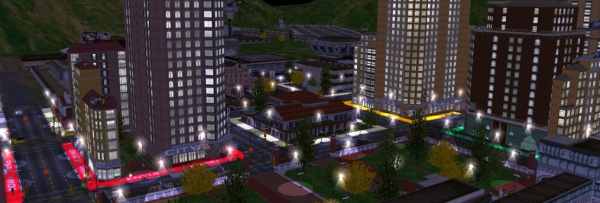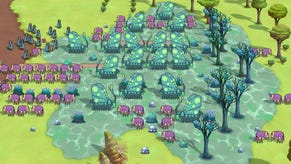The Making of: Monopoly Tycoon
[Ah, been a while. I did a series of Post Mortems for PC Format over a few years, chatting to a dev a month about the development of a game. I've republished the vast majority here already, but I find there's a few left over like this one with Deep Red in 2006 about Monopoly Tycoon. It's one of the games which I felt as if I was just about the only person in the demi-core-gamer demographic to actually get it.]
Monopoly Tycoon wasn’t what anyone expected. With the licence of a family-favourite boardgame of Christmas plutocratic warfare, you’d expect something entirely traditional. What resulted wasn’t just a brilliantly conceived reinventation – but also a brilliant game of financial warfare from Deep Red, who’ve gone on to explore similar entrepreneurial terrain ever since. Looking back five years, we chat to Managing Director and Deep Red founder Clive Robert about how the game came together.
“Monopoly Tycoon was, for us, a very cool opportunity,” he saays, “My background is in Hasbro and Parker and the boardgame industry. It meant that we could create a game which bridged the gap between board and computer games. We didn’t want to do what everyone else had done, which was a version of Monopoly where you put the game board vertically and put it on the screen and play the exact same experience as the boardgame… except the boardgame was far more fun. We wanted to use the key elements of Monopoly and actually create a game that was specific for the PC. The game was different to Monopoly, but you always felt like you were playing Monopoly”.
While deep structure was one issue, a lot of this was achieved in a more aesthetic manner. By looking like Monopoly Tycoon and using its signifiers, Deep Red managed to maintain its atmosphere. “Through taking the key elements – like, say, the colours,” Clive says, “If you play Monopoly Tycoon, you’ll see all those blocks are in those familiar colours. So Pall Mall is always purple, Park Lane is always dark blue, Bond Street was always Green… and really posh, and Whitechapel, being brown, was not posh. Taking those colour cues from the original game really worked to cue the Monopoly Feeling”
The bigger initial design issues were more in the approach. “The problem was divorcing ourselves from Monopoly, and realising that we were making social-sim and world-building game… we’re not building Monopoly anymore,” Clive says, “Trying to differentiate away from Monopoly, while maintaining some Monopoly feel. We could have developed a Monopoly boardgame or a Tycoon game, but what we were desperately trying to do was to make something in the middle. The teething problems were building something that was neither one nor the other.”
“I don’t think we got it entirely right either,” Clive says, “We made a game that was far more hardcore than originally planned, and wasn’t the easiest game to play in terms of the learning curve. It’s pretty steep, and have to be a pretty damn good gamer to get anywhere in Monopoly, as successful as it was.” Even come release, there were some judgments that they decided they were in error, swiftly deciding to release a patch to cure them. “There were two big issues with the originally shipping game,” Clive says, “The first one was that we insisted the player play through the entire game before gaining access to the Sandbox mode, where everything – all the blocks, the development tree and so on – were available. Initially we kind of saw that as cheating, so we didn’t include it from the off. Also, we’d made a game that was level based… and once you’d completed the level, the scenario ended and moved onto the next one.” Sound sensible enough. Thousands disagreed. They didn’t just come to Monopoly Tycoon to play levels.
“We got huge stick, as people said “I’ve completed the winning criteria… but I want to continue fiddling. I want to play in my little world. I don’t care about any kind of winning condition.”,” Clive says, “So we issued a patch really quickly as there were a lot of complaints, to allow you to play on and unlocked sandbox mode immediately.” This is something they’ve learnt from, and now all their games are built with this in mind. For example, while the recent Tycoon City: New York unlocks new districts as you play, your previously constructed areas remain in play for you to play with and admire.
As a game, Clive’s particularly pleased that it found its audience with just under two-million units sold. However, this wasn’t in one week. “It took years to do the 2 million units,” Clive says, “When you compare that to something like the games that are selling today, the big uber-games that launch, will sell 2 million games in six months… then sink without trace. The thing about Monopoly Tycoon is that I still receive royalty cheques. It’s still selling. It may be £9.99 – maybe even £4.99 now – but it’s still selling and people still want to buy it. It’s received that sort of classic status. It’s just brilliant for us”
This makes management games different from many games in the marketplace. “First-person shooters don’t sell well for years,” argues Clive, “They sell really well for the first couple of months when there’s all the marketing, and disappear without a trace. But world-building, social-sims, God-games, Tycoon games… they just sell forever.” An old observation in games magazine lore is that a first-person shooter will sell more copies of a magazine if you put it on the cover than a strategy game, even if the strategy game ends up selling over twice as many copies. There’s different demographics being reached, who react in different ways.
“For me, it comes back to something more simplistic,” Clive says, “Strategy games and tycoon games just aren’t sexy. Shooting games are sexy. Every developer wants to work on them, every programmer wants to code for them and every artist wants to be doing huge great Orc type characters with armour… while world-building games are based around Uncle Pennybags and Apartment Blocks. They just aren’t sexy. They don’t sell magazines and are never going to set the world on fire… but they do chug on forever and ever. Which is why Publishers love them so much, and why pretty much every publisher has a back-catalogue line up featuring them as they know they have a peak/trough income problem with their high-profile games that will be evened out by the Tycoon games chugging along in the background. And if as a developer you’re prepared to be a chugging away in the background type of bloke, then there’s a great life to be had.”
While he argues the RTS is struggling, the Tycoon game’s is getting increasingly large crossover appeal. “Internally our mindset has gone from saying “We build Tycoon Games” to “We build social-simulations”. I think that’s what we do,” Clive claims, “We try to simulate social environments, which works really well for us and plays into the dynamics of what people want these days. Even though ostensibly it’s the same thing, we change the wrapper. As opposed to people getting feedback on a graph, they get feedback from – say – when they build a café people really enjoying your cup of coffee.”
It's that advice Clive gives to anyone wanting to pursue an entrepreneurial games? “Don’t do it. That’s my bag,” Clive jokes before thinking. “Don’t hark back to the old Tycoon games,” he eventually offers, “Make it all about the social simulations. These games these days are all about the nurturing and love angle to be built into these games. They aren’t concerned and passionate about a Bakery or an Apartment block or a café… but they are passionate about whether it’s liked by its inhabitants. They need to be a voyeuristic experience, about doing stuff and then watching what people do and so getting involved. Being a voyeur is where it’s at”. What do we learn from this? Player feedback counts. Also, anyone who lives near Deep Red’s HQ, be sure to close your window while getting changed.












